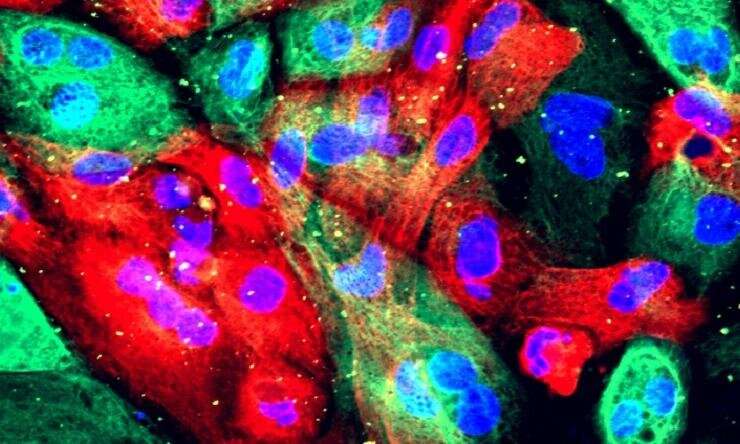This article has been reviewed according to Science X's editorial process and policies. Editors have highlighted the following attributes while ensuring the content's credibility:
fact-checked
peer-reviewed publication
trusted source
proofread
Combination treatment improves survival in advanced prostate cancer with genetic mutations

A combination therapy improved progression-free survival in patients with metastatic castration-resistant prostate cancer with distinct genetic mutations compared to either therapy alone or sequentially, according to results from a Northwestern Medicine-led multi-center clinical trial published in the journal Clinical Cancer Research.
"The trial design allowed us to evaluate the efficacy of abiraterone/prednisone versus olaparib versus a combination of the two treatments as first-line treatment for men with mCRPC whose tumors had specific genetic alterations," said Maha Hussain, MD, the Genevieve E. Teuton Professor of Medicine in the Division of Hematology and Oncology, who was lead author and the principle investigator of the study.
"The results clearly indicate that the combination of abiraterone/prednisone plus olaparib resulted in higher response rates and longer time to disease progression compared to either agent alone or sequentially."
Metastatic castration-resistant prostate cancer (mCRPC) occurs when prostate cancer which has spread to different parts in the body stops responding to hormone treatment and spreads to other parts of the body. Approximately 25% of patients with mCRPC express unique genetic alterations known as homologous recombination-repair mutations (HRRms), namely in the BRCA1/2 and ATM genes, underscoring the need for more targeted therapies for this subgroup of patients.
Olaparib, a PARP inhibitor that inhibits the poly ADP ribose polymerase enzyme, which is involved in DNA repair, was approved by the FDA in 2020 for the treatment of mCRPC for patients with HRRms who experienced cancer progression following prior hormonal therapy.
"PARP1 is a co-activator in both prostate cancer development and androgen signaling. Abiraterone (CYP17 inhibitor) reduces androgen production, thus decreasing AR-mediated signaling. AR and PARP1 signaling interact cooperatively, and therefore, inhibiting both pathways may prove superior to either alone," said Hussain, who is also deputy director of the Robert H. Lurie Comprehensive Cancer Center of Northwestern University.
In the current clinical trial, Hussain's team and her collaborators evaluated the efficacy of abiraterone/prednisone versus the PARP-inhibitor, olaparib, versus a combination of the two treatments as first-line therapy in patients with mCRPC and HRRms.
A total of 61 patients with mCRPC and HRRms were randomly assigned to receive one of the following treatments: abiraterone acetate plus prednisone (1,000 milligrams daily plus five milligrams of prednisone twice daily), olaparib (300 milligrams twice daily), or abiraterone and prednisone plus olaparib (1,000 milligrams of abiraterone daily, five milligrams of prednisone twice daily and 300 milligrams of olaparib twice daily).
All patients continued treatment until their cancer progressed; patients on either single-agent portion of the study could switch to the other if their cancer progressed.
Overall, patients who received the combination of abiraterone and prednisone plus olaparib demonstrated improved progression-free survival compared to patients who received either therapy, alone or sequentially.
"Our data showed that the combination therapy resulted in more than two-fold increase in the median time to disease progression compared to single-agents or sequentially following progression," Hussain said.
"More research is needed to better understand why prostate cancer cells become resistant to current medications so that researchers can develop more effective treatments, including combination therapies, that produce a better response and disease control, and to better understand how these therapies may play a potential role in earlier disease settings."
More information: Maha Hussain et al, Abiraterone, Olaparib, or Abiraterone + Olaparib in First-Line Metastatic Castration-Resistant Prostate Cancer with DNA Repair Defects (BRCAAway), Clinical Cancer Research (2024). DOI: 10.1158/1078-0432.CCR-24-1402



















